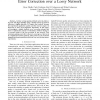Free Online Productivity Tools
i2Speak
i2Symbol
i2OCR
iTex2Img
iWeb2Print
iWeb2Shot
i2Type
iPdf2Split
iPdf2Merge
i2Bopomofo
i2Arabic
i2Style
i2Image
i2PDF
iLatex2Rtf
Sci2ools
119
click to vote
ICNSC
2007
IEEE
2007
IEEE
Analysis of a Simple Feedback Scheme for Error Correction over a Lossy Network
Abstract— In time varying packet-switched networks, delivering data with high reliability using a limited amount of network resources is highly desirable. To capture the trade-off between the experienced application quality and the resource usage it is important to have good adaptation algorithms. In this paper, we investigate a simple feedback error correction scheme that aims to optimize the amount of redundancy without relying on a accurate model of the loss processes of the network. This extremum-seeking controller is shown to converge to a limit cycle in a neighborhood of the optimum. These result are also evaluated using packet-based simulation with data from real wireless sensor experiments.
Abstract— In Time | Computer Networks | Error Correction Scheme | Experienced Application Quality | ICNSC 2007 |
Related Content
| Added | 03 Jun 2010 |
| Updated | 03 Jun 2010 |
| Type | Conference |
| Year | 2007 |
| Where | ICNSC |
| Authors | Oscar Flardh, Carlo Fischione, Karl Henrik Johansson, Mikael Johansson |
Comments (0)

